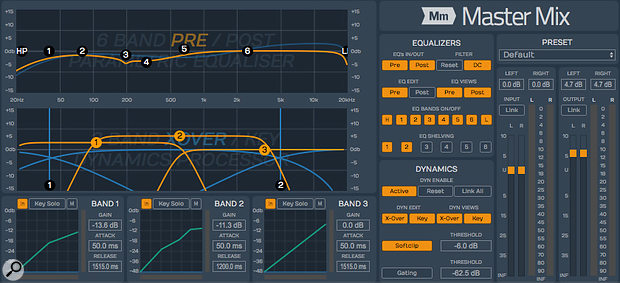 Tracktion’s Master Mix plug-in is a simple but sophisticated one-stop mastering processor at a remarkably affordable price.
Tracktion’s Master Mix plug-in is a simple but sophisticated one-stop mastering processor at a remarkably affordable price.
From the days when cigar-toting label execs regarded the mix-bus compressor as a magic button which could transform difficult recording sessions into Top 40 hits, to the current generation of home-studio dance producers crushing headroom-hungry club anthems, the multi-band mix-bus compressor has been one of the most widely used — and abused — tools in the sound engineer’s kit.
With their ever-increasing sophistication, such tools don’t tend to come cheap, so Tracktion developer Julian Storer’s reinvention of his Final Mix mastering suite is an affordably welcome development: a cross-platform mastering suite which will run in any DAW that supports VST or AU format, or equally well in Pro Tools within a ‘wrapper’ such as DDMF’s Metaplugin.
At the heart of Master Mix is its sophisticated three-band dynamic processor. Each band can optionally be defined using multiple nodes, enabling users to shape the dynamic contour of each band very precisely for surgical sound-design precision. These are complemented by two banks of six-band parametric EQs with which to sculpt sound pre- and post-compression, plus a gate and a soft-clipping limiter.
Visually, the interface’s three familiar editor displays present EQ curves, dynamic crossovers and dynamic curves with a simple and tidy economy that makes the plug-in a breeze to use. But leaving functionality and presentation aside, when it comes to bringing your final mixes to life, can a $60 plug-in like Master Mix step up? The good news for anyone on a budget is that Master Mix is capable of producing a more than passable comparison with some altogether more expensive rivals. Clarity, consistency, punch and — yes — loudness can be introduced to main mixes or submixes while retaining control over the bottom end, and some attractive sweetness can be added to the high mids, where Master Mix can be especially musically sympathetic on acoustic instruments and voices, with just enough of a hint of grit to keep the top end compelling.
At risk of looking a highly affordable horse in the mouth, though, there are times where one might wish to augment Master Mix’s most useful features with additional plug-ins further down the mastering chain. While EQ’ing and compressing your master bus within the same plug-in might be both time- and cost-efficient, in terms of creative enhancement, Master Mix’s EQ can’t be expected to substitute for the luxury of picking and choosing from a range of more characterful (and inevitably more expensive) EQs further down your own mastering chain. And to my ears, Master Mix produced a more satisfying result when deployed in tandem with a separate tape-saturation emulator to introduce some warmth back into the final master. Master Mix’s presets offer some interesting points of departure, but for the ingénu bedroom masterer seeking an affordable plug-in to get started with, a video tutorial walking the user through the effects chain could make an excellent future addition. Ultimately, though, Master Mix’s neat combination of convincing sound processing, design simplicity and sophisticated functionality is a winning one, and at such a competitive price, this one-stop box of mastering tools is a giveaway.
$59.99
$59.99
